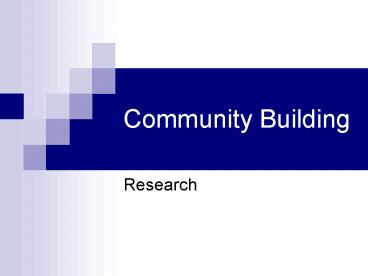Community Building - PowerPoint PPT Presentation
1 / 25
Title: Community Building
1
Community Building
- Research
2
Community Building Group Time
- Set up your Museum Pieces.
- Browse.
- Form small groups to share favorite childrens
book. - Determine Readability for each book in your
group. - Share whole class.
3
In the practice of being community members,
children find models and pathways that help them
move beyond themselves to connect with others and
to make contributions for the greater good. Ruth
Charney
4
The beginning of the school year is one of the
times when the broad concept plays a significant
role in curriculum development and organization.
Community building experiences are introduced
with an emphasis on relating these experiences to
the broad concept. Crawford 1998
5
Broad Concepts
- A broad umbrella concept is one from which almost
any topic or issue could be examined so there is
no limit on what students can decide to pursue.
Concepts such as Discovery, Sense of Place,
Relationships, Changes, Harmony, and Making a
Difference are just a few examples that can cut
across all content areas.
Short, Schroeder, Laird, Kauffman, Ferguston,
Crawford, 1996
6
Common Experiences for Conceptualizing Harmony
within our Classes
- Whole Class Read Alouds We compiled a literature
list of nine books to read aloud in our
classrooms at the start of the school year. These
books were shared and discussed with our whole
class using three discussion questions - What did you notice? - What did you think of?
- How did this make you feel?
- What Am I? by N. N. Charles
- Bein With You This Way by R. Nicola Lisa
- The World That Jack Built by Ruth Brown
- Something for Nothing by Phoebe Gillman
- My Many Colored Days by Dr. Seuss
- Seven Blind Mice by Ed Young
- Crysanthemum by Kevin Henkes
- Whoever You Are by Mem Fox
- What A Wonderful World by George Weiss and Bob
Thick
7
Common Experiences for Conceptualizing Harmony
within our Classes
- Creating Class Rules through Harmony In the
first two weeks of school, we wrote our class
rules together as a class. We discussed and
compiled our class rules through read alouds
about harmony with others. - Museum Collection We asked students to bring a
collection of items from home that represented
themselves. Through sharing our museum pieces and
reading books about harmony within ourselves, we
learned to appreciate one another. - Timeline of Self showing Harmony We asked
students to reflect upon their growth over time,
from the age of a baby up until now, at home with
their family. As we shared and discussed our
experiences, we learned about harmony of self and
change over time.
8
Common Experiences for Conceptualizing Harmony
within our Classes
- Getting to Know You Article We brainstormed
ideas for getting to know you questions with our
class. Then, students partnered up together to
conduct getting to know you interviews. The
students used their interviews to write getting
to know you articles about one another. Through
our experiences and literature discussions, we
learned about harmony with self and harmony with
others. - Concept of Harmony Web We asked students and
their family to discuss their definition of
harmony. Then, students brought an artifact to
school for sharing and discussing their
definition with the class. The sharing of these
artifacts became a tool for creating our own
class web of the concept of harmony.
9
Birthday Presents Example
10
Birthday Presents Example
11
- Something from Nothing Class book
- Class Rules from What a Wonderful World (read
aloud)
12
Harmonious Homework
13
Pictures
14
- The beginning of the school year is one of the
times when the broad concept plays a significant
role in curriculum development and organization.
Community building experiences are introduced
with an emphasis on relating these experiences to
the broad concept. - Crawford 1998
15
Umbrella
16
Parent Letter
17
- Harmony Class Book
- Family Web
- Pictures
18
Discussion
- Community Building Article
- Discuss in small groups
- Share highlighted or underlined areas of interest
- When your group finishes discussing, you may
browse the text set and sign up for a Strategy
Presentation date.
19
Browse Community Building Books
20
Writers Workshop
- The Writing Process Turn in small groups and
discuss what your experiences were with writing
during your K-9 years.
21
The Writing Process
- Brainstorming
- Prewriting
- Drafting
- Beginning
- Middle
- End
- Revising
- Editing
- Final Draft
- Sharing
- Publishing
22
- What are children doing at each stage of this
process? - What are you as the teacher doing during this
process?
23
Brainstorming
- What are some strategies in which students can
brainstorm? - Begin brainstorming ideas you have for writing.
24
For Next Time
- Beliefs About Literacy Learning and Teaching
- A Continuum from Behavioral to Psychosociolinguist
ic Approaches - Cueing Systems
- Models of Literacy
- Writers Workshop Genres of Writing
25
Homework
- Choose a strategy lesson and sign up for a date
to present. - Readings
- STW Introduction
- PKT Models of Literacy Handouts Chapter 2
from RMI RS, Chpt 1 and Figure 2-3 School Talk
Reading and Writing Workshop































